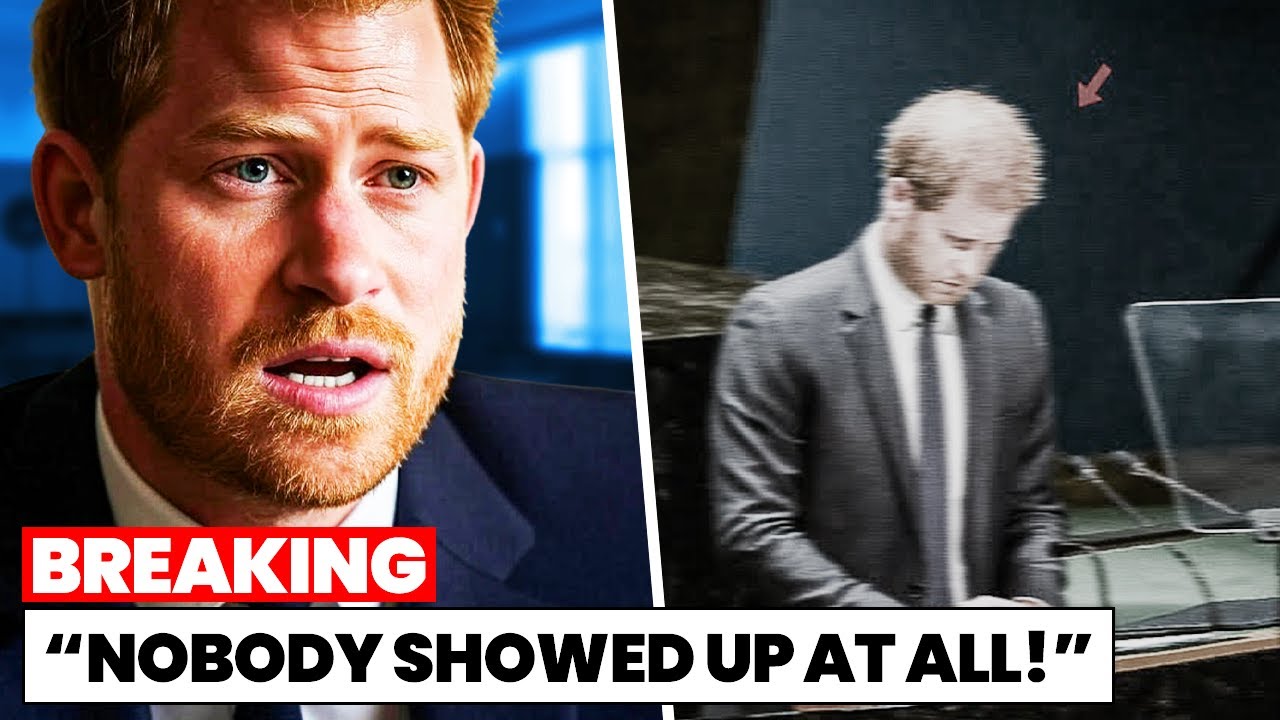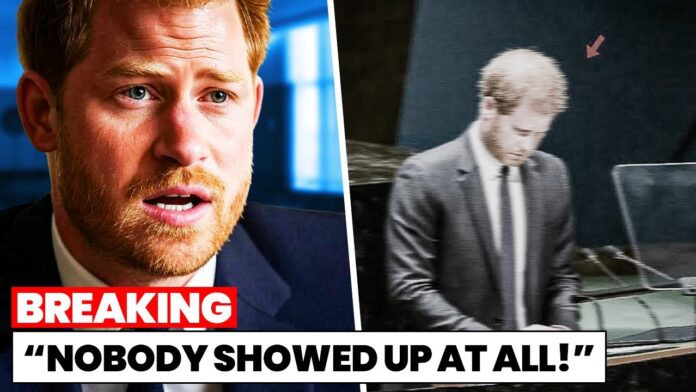😢 HEARTBREAKING: Prince Harry breaks down in tears upon landing in the UK for a long-awaited family reunion—only to face empty streets and zero fanfare from the crowds that once mobbed him! From Megxit fallout to fresh rifts with William and Kate, this solo return exposes the painful truth: Has the once-beloved Spare truly become persona non grata in his homeland? The isolation is gut-wrenching… What’s next for the lost prince? Click the link to see the emotional footage and join the debate raging online

Prince Harry, the Duke of Sussex, touched down at Heathrow Airport on September 8, 2025, his face a mask of quiet anticipation as he stepped onto British soil for the first time in months. But what unfolded over the next four days—a whirlwind of charity stops, a fleeting reunion with his father King Charles III, and poignant visits to old haunts—turned into a stark tableau of isolation that has royal watchers and fans alike reeling. Eyewitness accounts and viral social media clips paint a picture of barriers lined with more photographers than well-wishers, leaving the once-adoring public conspicuously absent. For a man who’s spent five years navigating the fallout from his dramatic exit from royal life, this return feels less like a triumphant homecoming and more like a sobering reminder of bridges burned. Whispers of tears in a private moment at Windsor Castle have only amplified the melancholy, prompting uncomfortable questions: Has Harry, at 41, finally lost the affection of the nation that once saw him as the cheeky spare to the throne?
The trip was billed as a low-key affair, centered on Harry’s longstanding patronage of WellChild, the charity supporting seriously ill children that he’s championed since 2007. Arriving amid speculation of a thaw in family tensions—fueled by King Charles’s ongoing cancer treatment and Harry’s own emotional pleas for reconciliation in recent interviews—the duke’s schedule included a visit to Nottingham’s Community Recording Studio on September 9 and the glitzy WellChild Awards gala in London the following evening. Tucked in between: a 53-minute private tea at Clarence House with his father, the first father-son sit-down in 19 months. Yet, from the outset, the optics were off. Social media erupted with videos showing vast stretches of empty metal barriers outside his events, cordoned off in anticipation of crowds that never materialized. “It was eerie—fences for blocks, but just a handful of curious locals and the press pack,” one Nottingham bystander posted on X, a sentiment echoed across platforms. Another clip, shared widely by critics, captured Harry pausing at the airport arrivals, scanning the sparse welcome with what onlookers described as a “haunted look.”
The emotional nadir reportedly came later that evening at Windsor, where Harry made a solitary pilgrimage to his grandmother Queen Elizabeth II’s resting place in St. George’s Chapel—marking the third anniversary of her death on September 8, 2022. Sources close to the duke tell People magazine that he lingered longer than planned, emerging red-eyed and visibly shaken. “It hit him hard, being back without the pomp, without Meghan or the kids, and without the warmth he remembers from childhood,” the insider revealed. Harry’s memoir Spare, the 2023 blockbuster that laid bare his grievances, painted Windsor as a sanctuary of sorts; this visit, however, underscored its isolation. No family members joined him—no brother William, no sister-in-law Kate, not even a quiet nod from the palace. Just the duke, the ghosts of Christmases past, and a nation that, per recent YouGov polls, views him with a tepid 35% approval rating, down from 70% pre-Megxit.
This isn’t mere bad luck; it’s the culmination of a saga that’s twisted Harry’s bond with Britain into knots. Flash back to January 2020: The “Megxit” announcement, where Harry and Meghan Markle stepped back as working royals, citing suffocating media scrutiny and a desire for independence. It was framed as a fresh start, but five years on, the Sussexes’ life in Montecito, California—a $14 million mansion, Netflix deals, and Harry’s Invictus Games—has done little to mend fences. Harry’s legal battles over UK security, lost in courts as recently as April 2025, have painted him as a man adrift, unable to bring his family home without risking their safety. “Archie and Lilibet may never set foot here,” he lamented in a May ITV interview, his voice cracking as he described the “insane” toll on his children, now 6 and 4.
Meghan’s shadow looms large over the narrative. Absent from this trip—her first UK visit since 2019—she’s become a lightning rod for Harry’s detractors. Controversies from her lifestyle brand American Riviera Orchard’s rocky launch to whispers of marital strains have fueled tabloid tales of discord. X users, in threads dissecting the visit, point to Meghan as the “root of the rift,” with one viral post tallying “17 reasons Harry chose her over us—and lost everything.” Harry’s solo outing, insiders say, was a deliberate “olive branch” to the Firm, but it backfired spectacularly. While he dazzled at WellChild—presenting awards with his trademark charisma and announcing a £1 million personal donation to children’s hospices—the room buzzed more with pity than adulation. “He looked like a man trying too hard to convince himself he belonged,” a gala attendee told the Daily Mail.
The family dynamics add salt to the wound. That Clarence House tea? Cordial but clipped—Harry arrived via the visitor’s entrance, an aide in tow, and departed after less than an hour. King Charles, 76 and battling cancer since February 2024, has reportedly gone radio silent on his son’s calls since Spare‘s release, which branded him an absent father. Prince William, 43, and Kate Middleton, fresh from her own chemotherapy triumph, kept their distance entirely. William’s camp cited “scheduling conflicts,” but X lit up with speculation: “Will’s protecting his peace—no room for Harry’s drama,” one royal insider tweeted. The brothers’ once-close bond, forged in the crucible of their mother’s 1997 death, has frayed under the weight of Harry’s public airing of grievances—from William’s alleged physical altercation to claims of palace racism. A September 2025 Express report warned Charles of “sabotage” risks in reconciling, quoting experts who fear Harry’s “unpredictability” could embarrass the crown at a vulnerable time.
Public sentiment mirrors the chill. Pre-trip hype on X promised “redemption arcs,” but reality delivered indifference. Nottingham’s studio visit drew a smattering of locals—far from the throngs that greeted William and Kate at a Brighton rugby event the same week. At WellChild, barriers stretched empty under gray skies, a far cry from the 2018 hysteria. “He misses the roar of the crowd,” a former palace aide told Fox News. “Britain adored Harry the hero, not Harry the exile.” Polls bear it out: A fresh Ipsos survey post-visit shows UK favorability for the Sussexes at 28%, with 52% citing “family betrayals” as the turnoff. Younger Brits, Diana’s spiritual heirs, are split—some hail Harry’s vulnerability as modern royalty, others see entitlement.
Yet, glimmers of the old Harry shone through. At WellChild, he knelt to eye-level with pint-sized winners, his laughter genuine as he quipped about superhero capes. Donors praised his £1 million pledge as “life-changing,” a quiet counter to critics who call it “PR gloss over toxicity.” And that Windsor moment? For all its solitude, it humanized him— a son grieving a queen who, in her final years, reportedly urged him to “buck up” amid the Megxit storm. Harry’s post-trip statement to Reuters was stoic: “Grateful for the work, heartbroken for the distance—but hope endures.”
Zooming out, this episode encapsulates the Sussexes’ paradox: Global icons worth $60 million, yet pariahs in their roots. Harry’s Invictus Games, set for 2027 in Birmingham, dangle a UK lifeline—he’s vowed to attend, security woes be damned. But without mended ties, it risks echoing this trip’s emptiness. Meghan, filming a Netflix cooking series in Montecito, reportedly urged caution: “Don’t beg for what they’ve already taken,” a friend quotes her saying. Their children, shielded from the fray, ask innocent questions about “Grandpa’s castle” that cut deep.
Social media, ever the mirror, amplified the divide. Pro-Harry accounts shared edited clips of “adoring fans,” while detractors posted raw footage of vacant streets, captioned “The people have spoken.” TikToks dissected his body language—slumped shoulders at arrivals, forced grins at awards—racking up millions of views. Reddit’s r/RoyalsGoneWild subreddit, with 150,000 members, ran a thread titled “Harry’s Ghost Tour: When the Party’s Over,” blending sympathy with schadenfreude. Even neutral voices, like BBC’s Daniela Relph, noted the “palpable awkwardness” of a prince adrift in his own story.
For the Windsors, broader stakes loom. Charles’s health rally—public duties resuming in July—has steadied the ship, but Harry’s orbit threatens ripples. William, prepping for his 2026 investiture as Prince of Wales in Wales, eyes the future with Kate by his side, their Earthshot Prize drawing 500,000 attendees last year. “The Firm’s moving on,” a Kensington Palace source told the New York Post. “Harry’s welcome for causes, not chaos.” Reconciliation whispers persist—Ailsa Anderson, Queen Elizabeth’s ex-press secretary, called the tea a “massive step” in People—but trust rebuilds slowly. “Charles wants his boy back, but not at the cost of the crown,” she added.
As Harry jetted back to California on September 12, the tears at Windsor linger as a metaphor: A man confronting the chasm between who he was—the soldier, the showman—and who he’s become. Has he lost Britain’s support? The empty barriers suggest yes, at least for now. But Harry’s arc, from palace rebel to Pacific exile, defies tidy endings. In an era of fading monarchies—Spain’s recent scandals, Denmark’s abdication—his story probes deeper: Can a spare reclaim his place, or is exile the price of truth-telling? For the duke who once danced through VJ Day crowds, the silence of this return echoes loudest. Until the next flight lands, Britain holds its breath—and its distance.
